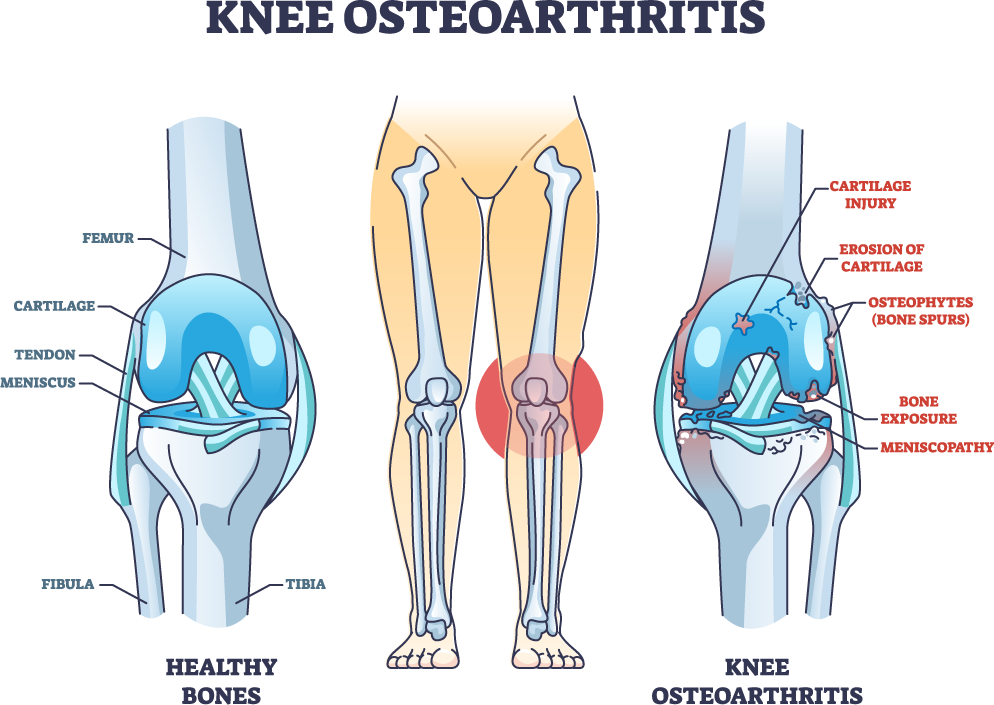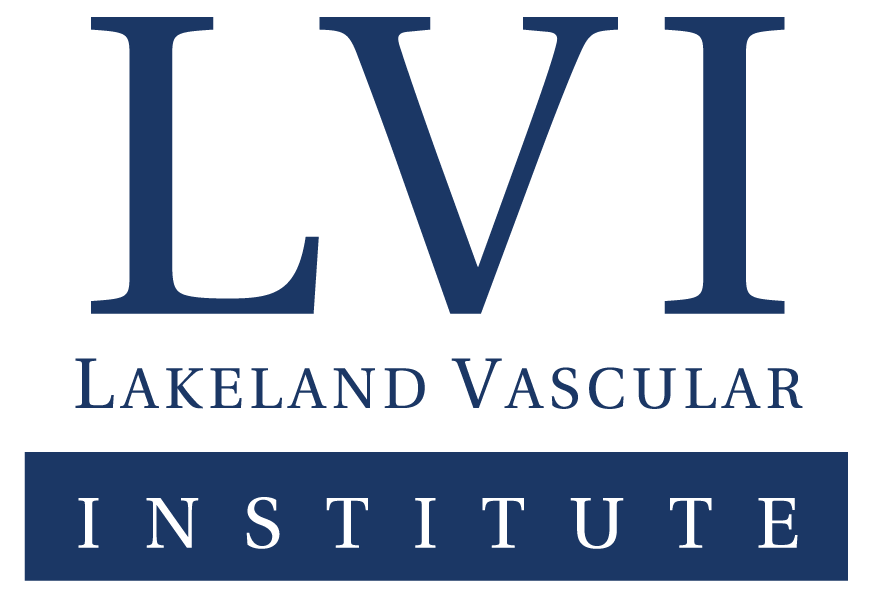1 in 3 Americans over 60 have osteoarthritis (OA) of the knee, and of those, 40% report bothersome symptoms. If you have experienced inflammation within your knee, you already know how painful it can be and how OA can get in the way of you living your life!
Total knee replacement surgery was once the only way to treat OA when it became severe. However, 2 out of 3 patients who qualify are unwilling to have this surgery,1,2 perhaps because of the risks of surgery or the long, painful recovery and many weeks of physical therapy required to restore normal function.
What’s more, treating this chronic pain with a lifelong medication regimen or frequent pain injections is not a good option for many people.

Fortunately, there is another treatment: Genicular artery embolization (GAE)
Recently, new information has come to light about the causes of OA within the knee. A condition called synovitis is now accepted as a critical driver of OA. As bone cartilage breaks down, it releases debris into the synovium, the lining of the knee which produces fluid to nourish and lubricate the knee joint. The debris triggers an increase in the production of T-cell lymphocytes and white blood cells that inflame the synovium and eat away at the cartilage within the joint.
The FDA-approved GAE procedure works by restricting the flow of blood to the synovium, which in turn decreases inflammation and the associated pain. A clinical study performed in 2021 demonstrated that the average pain scores decreased from 8 out of 10 to 3 out of 10 within the first week of the procedure.3
Waiting reduces your treatment options
OA is a progressive condition, which means the problem will only get worse over time. When the cartilage is completely gone, surgery may be your only option. However, having a GAE procedure while you still have knee cartilage will not only alleviate the symptoms you’re experiencing but may help you avoid the need for surgery down the road.
The GAE procedure
GAE is performed by an interventional radiologist who inserts a tiny catheter into an artery in your upper thigh or wrist, and then uses imaging to guide it through the body’s blood vessels to the genicular arteries that supply blood to the synovium, where inflammation occurs. Tiny particles are injected through the catheter into the artery, reducing the flow of blood. This results in a significant reduction in the inflammation associated with osteoarthritis, and a reduction in pain.
GAE is one of the minimally invasive treatments available at Lakeland Vascular Institute. We perform GAE in our convenient outpatient center, with no general anesthesia required. In fact, you can resume most normal activities a few hours after the procedure. Most patients are surprised to find out how fast, easy and effective this procedure really is!
Genicular artery embolization is recommended if you:
- Are 40-80 years of age
- Have moderate to severe knee pain
- Are diagnosed with osteoarthritis based on X-ray or other imaging, but without bony deformity/sclerosis
- Experience local knee tenderness
- Do not wish to have total knee replacement surgery

Frequently Asked Questions: Genicular Artery Embolization
Osteoarthritis is a common health condition as we age. It is a progressive disease that causes chronic inflammation within the knee joint, which both causes pain and accelerates the wearing down of the remaining cartilage within the knee.
When the condition is mild to moderate, most doctors prescribe “conservative” therapies such as medication, cortisone injections and physical therapy. When it becomes severe, many doctors advocate total knee replacement or total knee arthroscopy (TKA) surgery. A new treatment option called genicular artery embolization is now available for patients with moderate to severe knee osteoarthritis, but there must be remaining cartilage within the knee to qualify for the procedure.
GAE is a minimally invasive treatment for knee osteoarthritis. It is an outpatient procedure performed by an interventional radiologist, a doctor who uses medical imaging to guide treatment inside the body using tiny catheters navigated through the blood stream. The procedure partially blocks the flow of blood through one or more of the genicular arteries that supply blood to the synovium—the lining of the knee. The reduced blood flow in turn reduces inflammation within the joint, dramatically reducing pain and slowing or halting further cartilage erosion.
The full effect of pain relief is achieved about 2 weeks after the procedure, but many patients report reduced pain in the days immediately following. GAE is clinically shown to reduce VAS pain scores from an average of 8 out of 10 to an average of 3 out of 10. Most patients are also able to reduce or eliminate the pain medication they have been taking for their condition.
Clinical studies have shown that the effects of GAE will last for four years or longer. If needed, the procedure can be performed again in the future, and it does not impact your ability to have knee replacement surgery down the road if you so choose.
No, Genicular Artery Embolization has been performed at hospitals and leading health systems for many years and has a proven track record for success. It is FDA-approved and covered by insurance.
Yes, in fact the procedure is safer than surgery. With GAE there is no general anesthesia required, and no hospital stay, two factors that increase risk. GAE complications are very rare. The most common complication is temporary skin discoloration or bleeding at the catheter site, which typically goes away on its own.
Yes, most insurance plans and Medicare cover the GAE procedure. If you call us, we are happy to answer any questions you may have about your insurance coverage for Genicular Artery Embolization.
Genicular Artery Embolization is recommended for patients between 40 and 80 years of age, have moderate to severe knee pain and have been diagnosed with osteoarthritis. It is appropriate for patients who have first tried conservative treatments that have not worked. It is also important that you have knee cartilage remaining to benefit from the procedure. If your cartilage has fully worn away, total knee replacement may be your only option.
Our doctors are among the most experienced in the region at performing GAE. In addition, GAE procedures are performed in our comfortable, state-of-the-art outpatient center, where patient service is elevated to a higher standard. Finally, procedures performed at our outpatient center cost less than those performed at a hospital, which can make a big difference even for insured patients.
If you feel that you may qualify for this procedure, please call us to arrange a consultation. We will work directly with your doctor to help determine if Genicular Artery Embolization is right for you.
To schedule your consultation, please call 863.577.0316 »
- Hawker G.A., Guan J., Croxford R., Coyte P.C., Glazier R.H., Harvey B.J., et al. A prospective population-based study of the predictors of undergoing total joint arthroplasty. Arthritis Rheum. 2006;54:3212–3220. doi: 10.1002/art.22146. [PubMed] [CrossRef] [Google Scholar]
- Hawker G.A., Wright J.G., Badley E.M., Coyte P.C. Perceptions of, and willingness to consider, total joint arthroplasty in a population-based cohort of individuals with disabling hip and knee arthritis. Arthritis Rheum. 2004;51:635–641. doi: 10.1002/art.20524. [PubMed] [CrossRef] [Google Scholar]
- https://www.sirweb.org/media-and-pubs/media/news-release-archive/sir-2021-knee-pain-031621/
